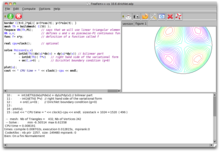FreeFem++
 FreeFem++-cs | |
| Developer(s) | Université Pierre et Marie Curie and Laboratoire Jacques-Louis Lions |
|---|---|
| Initial release | 1987; 37 years ago (1987) |
| Stable release | 4.9 / April 19, 2021; 3 years ago (2021-04-19) |
| Repository | github |
| Written in | C++ |
| Operating system | Linux, macOS, Microsoft Windows, Solaris |
| License | LGPL version 2.1 or later |
| Website | freefem |
FreeFem++ is a programming language and a software focused on solving partial differential equations using the finite element method. FreeFem++ is written in C++ and developed and maintained by Université Pierre et Marie Curie and Laboratoire Jacques-Louis Lions. It runs on Linux, Solaris, macOS and Microsoft Windows systems. FreeFem++ is free software (LGPL).[1][2]
FreeFem++ language is inspired by C++. There is an IDE called FreeFem++-cs.
History
The first version was created in 1987 by Olivier Pironneau and was named MacFem (it only worked on Macintosh); PCFem appeared some time later. Both were written in Pascal.
In 1992 it was re-written in C++ and named FreeFem. Later versions, FreeFem+ (1996) and FreeFem++ (1998), used that programming language too.
Other versions
- FreeFem++ includes versions for console mode and MPI
- FreeFem3D
Deprecated versions:
- FreeFem+
- FreeFem
See also
References
External links
- Official website
- v
- t
- e
| Discontinued |
|
|---|
- DADiSP
- FEATool Multiphysics
- GAUSS
- LabVIEW
- Maple
- Mathcad
- Mathematica
- MATLAB
- Speakeasy
- VisSim
 | This computational physics-related article is a stub. You can help Wikipedia by expanding it. |
- v
- t
- e









